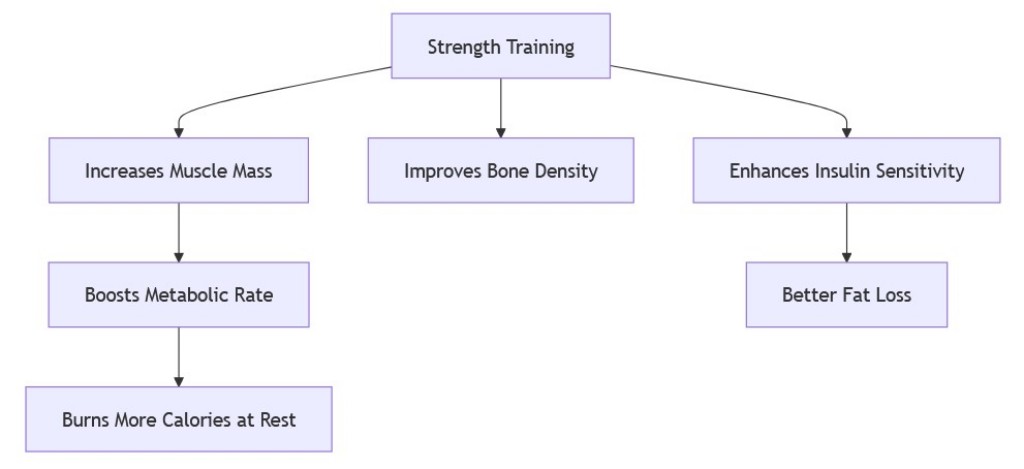Have you ever felt frustrated with weight loss advice that seems to work for everyone except you?
You’re not alone.
Women’s bodies face unique challenges when it comes to weight loss – from hormonal fluctuations to different metabolic needs. But here’s the good news: sustainable weight loss is absolutely achievable when you have the right strategies in place.
Contents
- 1 Why Traditional Weight Loss Advice Often Fails Women
- 2 1. Optimize Your Protein Intake
- 3 2. Strategic Carbohydrate Timing
- 4 3. Embrace Strength Training
- 5 4. Smart Cardio Implementation
- 6 5. Hormone-Conscious Eating
- 7 6. Quality Sleep Optimization
- 8 7. Stress Management Techniques
- 9 8. Smart Supplementation
- 10 9. Mindful Eating Practices
- 11 10. Progressive Overload in Training
- 12 11. Strategic Meal Timing
- 13 12. Social Support Systems
- 14 13. Regular Progress Tracking
- 15 14. Recovery Optimization
- 16 15. Sustainable Habit Formation
- 17 FAQ
- 18 The Bottom Line
Why Traditional Weight Loss Advice Often Fails Women
Before diving into what works, let’s address why many women struggle with conventional weight loss approaches. Women’s bodies are uniquely designed to maintain higher body fat percentages than men (essential for reproductive health), and we face distinct hormonal influences that can impact weight loss. Understanding these differences is crucial for success.
The Female Advantage: Your Secret Weight Loss Weapon
While certain biological factors might seem like obstacles, women actually have several advantages when it comes to weight loss:
- Higher pain tolerance for consistent exercise
- Better fat-burning efficiency during low-intensity activities
- Superior nutrient partitioning when eating protein
- Greater mindfulness around food choices
Let’s leverage these advantages with proven strategies that work specifically for women.
1. Optimize Your Protein Intake
Protein is your weight loss ally. Here’s why:
- Preserves lean muscle during weight loss
- Increases satiety and reduces cravings
- Requires more energy to digest than other macronutrients
Action Step: Aim for 0.8-1.0 grams of protein per pound of target body weight. For a 150-pound woman, that’s 120-150 grams daily.
Learn more about resistance band workouts for muscle gain
2. Strategic Carbohydrate Timing
Rather than eliminating carbs, time them strategically:
- Consume most carbs around workouts
- Include carbs in your post-exercise meals
- Reduce (don’t eliminate) carbs on rest days
3. Embrace Strength Training
One of the biggest myths is that women should focus solely on cardio. Here’s the truth about strength training:

Discover effective home strength training programs
4. Smart Cardio Implementation
Instead of endless treadmill sessions, try this approach:
| Type of Cardio | Benefits | Frequency | Duration |
| HIIT | Maximum calorie burn, time-efficient | 2-3x/week | 20-30 mins |
| LISS | Fat burning, recovery-friendly | 2-3x/week | 30-45 mins |
| Daily Walking | Base activity, stress reduction | Daily | 30+ mins |
Learn more about HIIT vs LISS cardio
5. Hormone-Conscious Eating
Understand and work with your hormonal cycle:
- Week 1-2: Higher intensity workouts, slightly higher carbs
- Week 3-4: Focus on strength maintenance, increase protein
- Throughout: Maintain consistent meal timing
6. Quality Sleep Optimization
Poor sleep can sabotage weight loss efforts by:
- Increasing hunger hormones
- Reducing insulin sensitivity
- Decreasing workout performance
Action Step: Aim for 7-9 hours of quality sleep per night.
7. Stress Management Techniques
Chronic stress leads to elevated cortisol, which can:
- Increase belly fat storage
- Trigger emotional eating
- Reduce workout recovery
Discover exercise benefits for mental health
8. Smart Supplementation
Consider these evidence-based supplements:
- Protein powder for convenient protein intake
- Omega-3s for inflammation reduction
- Vitamin D for hormone balance
- Magnesium for sleep and recovery
9. Mindful Eating Practices
Implement these strategies:
- Eat without distractions
- Use smaller plates
- Chew thoroughly
- Stop at 80% full
10. Progressive Overload in Training
Continuously challenge your body by:
- Increasing weights gradually
- Adding more repetitions
- Decreasing rest periods
- Improving form
Learn about the progressive overload principle
11. Strategic Meal Timing
Optimize your eating schedule:
- Eat within 1 hour of waking
- Space meals 3-4 hours apart
- Consider a 12-hour eating window
12. Social Support Systems
Build your support network:
- Join women’s fitness groups
- Share goals with family
- Find a workout buddy
- Consider working with a trainer
13. Regular Progress Tracking
Track more than just weight:
- Body measurements
- Progress photos
- Strength gains
- Energy levels
- Sleep quality
14. Recovery Optimization
Implement these recovery strategies:
- Active recovery days
- Regular stretching
- Proper hydration
- Stress management
15. Sustainable Habit Formation
Focus on building lasting habits:
- Start with small changes
- Build consistency before intensity
- Celebrate non-scale victories
- Plan for setbacks
Discover how to stay motivated working out at home
FAQ
How long should it take to see results?
Healthy weight loss typically occurs at 0.5-2 pounds per week. Focus on consistency rather than speed.
Should women avoid heavy weights?
No! Heavy weight training is beneficial for women’s bone health, metabolism, and body composition.
What about supplements for fat loss?
Focus on basics first: protein, omega-3s, and vitamins D and B12 if deficient.
How can I prevent plateaus?
Regularly adjust your program, track progress, and ensure adequate recovery.
The Bottom Line
Successful weight loss for women isn’t about extreme diets or endless cardio – it’s about working with your body’s natural processes while building sustainable habits. Focus on implementing these strategies one at a time, and remember that consistency trumps perfection.
Ready to start your weight loss journey? Check out our comprehensive 6-week diet and workout plan designed specifically for women like you.
Remember, your weight loss journey is unique to you. By implementing these evidence-based strategies while listening to your body, you’ll be well on your way to achieving your goals in a healthy, sustainable way.


